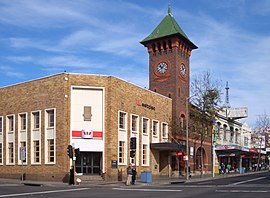Burwood, New South Wales
|
Burwood Sydney, New South Wales |
|||||||||||||
|---|---|---|---|---|---|---|---|---|---|---|---|---|---|

Burwood Road. The brick tower is part of Burwood Post Office (designed by government architect Walter Liberty Vernon).
|
|||||||||||||
| Population | 12,466 (2011 census) | ||||||||||||
| Established | 1814 | ||||||||||||
| Postcode(s) | 2134 | ||||||||||||
| Location | 11 km (7 mi) west of Sydney CBD | ||||||||||||
| LGA(s) | Burwood Council | ||||||||||||
| State electorate(s) | Strathfield | ||||||||||||
| Federal Division(s) | Reid, Watson | ||||||||||||
|
|||||||||||||
Burwood is a suburb in the Inner West of Sydney, in the state of New South Wales, Australia. It is 12 kilometres west of the Sydney central business district and is the administrative centre for the local government area of Burwood Council.
Burwood Heights is a separate suburb to the south. The Appian Way is a street in Burwood, known for its architecturally designed Federation-style homes.
Archaeological evidence indicates people were living in the Sydney area for at least 11,000 years. This long association had led to a harmonious relationship between the indigenous inhabitants and their environment, which was interrupted by the arrival of the British in 1788. The European desire to cultivate the land aided and abetted by a smallpox epidemic that forced the local people, the Wangal clan, away from their source of food and their spiritual connection with the land.
Captain Thomas Rowley (1748–1806) received a grant of 260 acres (110 ha) in 1799, and called his property Burwood Farm after Burwood Park, England. Following more land grants, his estate increased to 750 acres (300 ha). The grant stretched from Parramatta Road to where Nicholson Street and The Boulevarde are today and eastwards where to Croydon railway station is now. This is where he ran merino sheep on the property.
The first house, Burwood Villa, was built in the area in 1814, the same year that a stagecoach began running between Sydney and Parramatta. Burwood became a staging post along the road and the beginnings of a settlement started to develop. One of its most prominent early residents was Dr. John Dulhunty, a former naval surgeon who was appointed the Superintendent of Police for the Colony of New South Wales after his arrival in Sydney from England in 1826. Dr. Dulhunty became famous in the colony for fighting a gang of bushrangers that attacked his residence, Burwood House. He died suddenly in the house in 1828 but his son, Robert Dulhunty, went on to become the founder of the New South Wales regional city of Dubbo.
...
Wikipedia
